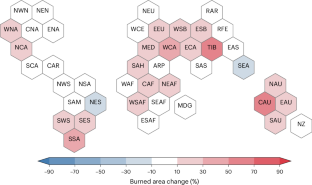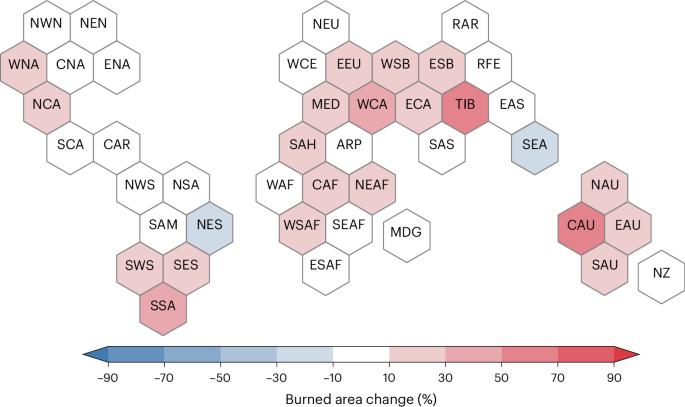气候变化对全球火灾的影响日益严重
IF 29.6
1区 地球科学
Q1 ENVIRONMENTAL SCIENCES
引用次数: 0
摘要
在影响归因框架内,使用了多种火灾模型来探讨气候变化对全球火灾的影响。研究结果表明,气候变化正在增加大多数地区的火灾面积,尤其是在火灾活动高峰期,而且这种影响会随着时间的推移而加剧。不过,人口和土地使用的变化正在减轻气候变化的一些影响。本文章由计算机程序翻译,如有差异,请以英文原文为准。


Climate change is increasingly affecting fires worldwide
Multiple fire models, within an impact attribution framework, have been used to explore how climate change is impacting fire worldwide. Results show that climate change is increasing burned area in most regions, particularly during periods of peak fire activity, and this effect is increasing over time. However, changes in population and land use are mitigating some of the effects of climate change.
求助全文
通过发布文献求助,成功后即可免费获取论文全文。
去求助
来源期刊

Nature Climate Change
ENVIRONMENTAL SCIENCES-METEOROLOGY & ATMOSPHERIC SCIENCES
CiteScore
40.30
自引率
1.60%
发文量
267
审稿时长
4-8 weeks
期刊介绍:
Nature Climate Change is dedicated to addressing the scientific challenge of understanding Earth's changing climate and its societal implications. As a monthly journal, it publishes significant and cutting-edge research on the nature, causes, and impacts of global climate change, as well as its implications for the economy, policy, and the world at large.
The journal publishes original research spanning the natural and social sciences, synthesizing interdisciplinary research to provide a comprehensive understanding of climate change. It upholds the high standards set by all Nature-branded journals, ensuring top-tier original research through a fair and rigorous review process, broad readership access, high standards of copy editing and production, rapid publication, and independence from academic societies and other vested interests.
Nature Climate Change serves as a platform for discussion among experts, publishing opinion, analysis, and review articles. It also features Research Highlights to highlight important developments in the field and original reporting from renowned science journalists in the form of feature articles.
Topics covered in the journal include adaptation, atmospheric science, ecology, economics, energy, impacts and vulnerability, mitigation, oceanography, policy, sociology, and sustainability, among others.
 求助内容:
求助内容: 应助结果提醒方式:
应助结果提醒方式:


